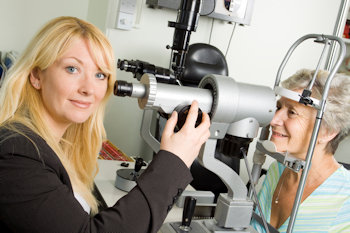Glaucoma Doctors in Southwest Florida
Glaucoma can occur and worsen without your being aware of it. The doctors at Elmquist Eye Group in Southwest Florida are skilled at diagnosing glaucoma, even in its earliest stages, and can help you decide upon the best course of treatment for the disease.

Dr. Yasaira Rodriguez is a board certified ophthalmologist, and Drs. Wagner and Burt are board certified optometrists. We are proud to offer state-of-the-art facilities and a wide variety of services, from routine eye exams for glasses to laser cataract and glaucoma surgery.
About Glaucoma
Glaucoma is a disease that affects the optic nerve located at the back of the eye. Although high eye pressure sometimes leads to glaucoma, many people with high eye pressures never develop the disease, and some people with glaucoma have normal eye pressures.
The only way to know if you have glaucoma is through regular eye exams at Elmquist Eye Group.
There are different forms of glaucoma, but these are the two most common:
Open-angle glaucoma
Open-angle glaucoma is the most common form of glaucoma. If the “open” drainage angle of the eye becomes partially blocked and is not able to drain properly, it can lead to a buildup of pressure within the eye and damage the optic nerve fibers, causing loss of vision. The damage occurs so gradually and painlessly that you will most likely not be aware of any problem until the optic nerve has already been badly damaged.
For most people, eye drops prescribed to help reduce the pressure inside your eye. Sometimes, oral medications are also prescribed. When medications are not enough to keep the intraocular pressure under control, laser surgery or surgery in the operating room may be needed to help promote proper drainage and prevent fluid and pressure from building up.
Closed-angle glaucoma
Closed-angle glaucoma, also called angle-closure glaucoma or narrow-angle glaucoma, is less common than open-angle glaucoma. It occurs when the normally open drainage angle of the eye becomes completely blocked. This can cause intraocular pressure to build up rapidly and is a true eye emergency.
Symptoms of closed-angle glaucoma include severe eye pain, blurred vision, headache, rainbow haloes around lights, nausea and vomiting. This form of glaucoma demands immediate medical attention. If not treated immediately, closed-angle glaucoma can cause permanent blindness.
Who is at Risk for Glaucoma?
The Glaucoma Research Foundation estimates that about 3 million Americans have glaucoma and many don’t know they have it.
High-risk groups for glaucoma include people over 60 years of age, African Americans (who are 15 times more likely to be visually impaired from glaucoma than Caucasians), those with a family history of glaucoma, people with diabetes, and people who are severely nearsighted. But babies and young people can develop glaucoma, too.
If you are diagnosed with glaucoma or have risk factors for the disease, your doctor may ask you to have certain tests, such as visual fields, optic nerve analysis through use of a scanning laser, gonioscopy to assess the drainage structure of the eye, optic nerve photos, and a corneal thickness measurement.
A diagnosis of glaucoma is the first step toward preserving your vision. Make an appointment today with the doctors at Elmquist Eye Group in Southwest Florida at (239) 936-2020 to find out how to prevent further damage to your eyes.
